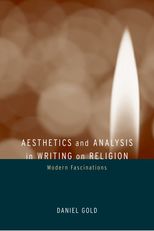 Aesthetics and Analysis in Writing on Religion: Modern Fascinations
Aesthetics and Analysis in Writing on Religion: Modern Fascinations
Contents
-
-
-
-
-
-
-
-
-
-
-
Large Explanation, Totality, and Community Large Explanation, Totality, and Community
-
The Middle of Religiohistorical Knowledge The Middle of Religiohistorical Knowledge
-
-
-
-
-
-
-
6 Relating Stories about Religious Traditions
Get access-
Published:June 2003
Cite
Abstract
Religious writing demands imagination and reason, but interpretive writers must give scientific reason to convince readers of the truth in their stories. Discussing stories shifts readers' attention to the element of believability that makes the aesthetic work. This chapter examines the scientific truths of interpretive writing in light of its aesthetic ones, exploring relationships between the two truths. Interpretive writing is limited in the degree of scientific truth it can attain, and its most appropriate range is a middle ground between isolated statements about particulars and grand generalities. Most interpretive writers tell two kinds of stories at once, each serving truths both scientific and aesthetic. Treating problems of truth and knowledge in religious studies brings forth awareness of the imperfections inherent in scholarly discourse, of the difficulty of making statements about religious traditions.
Sign in
Personal account
- Sign in with email/username & password
- Get email alerts
- Save searches
- Purchase content
- Activate your purchase/trial code
- Add your ORCID iD
Purchase
Our books are available by subscription or purchase to libraries and institutions.
Purchasing information| Month: | Total Views: |
|---|---|
| August 2024 | 2 |


Get help with access
Institutional access
Access to content on Oxford Academic is often provided through institutional subscriptions and purchases. If you are a member of an institution with an active account, you may be able to access content in one of the following ways:
IP based access
Typically, access is provided across an institutional network to a range of IP addresses. This authentication occurs automatically, and it is not possible to sign out of an IP authenticated account.
Sign in through your institution
Choose this option to get remote access when outside your institution. Shibboleth/Open Athens technology is used to provide single sign-on between your institution’s website and Oxford Academic.
If your institution is not listed or you cannot sign in to your institution’s website, please contact your librarian or administrator.
Sign in with a library card
Enter your library card number to sign in. If you cannot sign in, please contact your librarian.
Society Members
Society member access to a journal is achieved in one of the following ways:
Sign in through society site
Many societies offer single sign-on between the society website and Oxford Academic. If you see ‘Sign in through society site’ in the sign in pane within a journal:
If you do not have a society account or have forgotten your username or password, please contact your society.
Sign in using a personal account
Some societies use Oxford Academic personal accounts to provide access to their members. See below.
Personal account
A personal account can be used to get email alerts, save searches, purchase content, and activate subscriptions.
Some societies use Oxford Academic personal accounts to provide access to their members.
Viewing your signed in accounts
Click the account icon in the top right to:
Signed in but can't access content
Oxford Academic is home to a wide variety of products. The institutional subscription may not cover the content that you are trying to access. If you believe you should have access to that content, please contact your librarian.
Institutional account management
For librarians and administrators, your personal account also provides access to institutional account management. Here you will find options to view and activate subscriptions, manage institutional settings and access options, access usage statistics, and more.